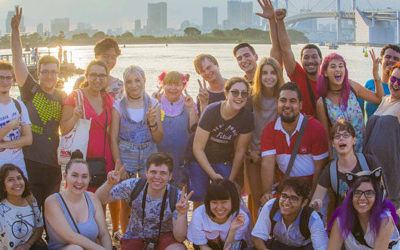***** Article first published on March 20, 2020 and updated on April 1st, 2021 *****
We know many people are wondering about the coronavirus (COVID-19) situation in Korea, so we wanted to give you the latest update from inside the country. Life continues as normal and there is currently 4 levels of social distancing in force. You are also required to wear a mask in indoor public areas and on public transport, as well as in outdoor areas if you cannot stay more than 2 metres away from others.
The Korean government has taken proactive steps to slow down the rate of infection and vaccinate the population.
Korea statistics
- You can see the latest data/numbers about COVID-19 in Korea here.
Entry and Quarantine Requirements
Before leaving for South Korea you must provide proof of a negative COVID-19 test 48 hours before departure. You must bring a paper copy of your test results with you in Korean or English. If the results are not in Korean or English, they must be translated to Korean or English.
As of February 4, 2022 passengers entering Korea are subject to 7 days of mandatory quarantine if they do not qualify for quarantine exemption. If you have been fully vaccinated with a WHO (World Health Organization) approved COVID-19 vaccine (Pfizer, AstraZeneca, Moderna, Sinopharm, Sinovac, or Janssen), you may qualify for a quarantine exemption.
Note the following information about quarantine:
- Korean nationals or foreign nationals with long-term visas can quarantine at their registered address or accommodation in Korea
- Foreign nationals with short-term visas will quarantine at a government designated facility at their own expense (about KRW 100,000-150,000 per day). The facility will be designated upon arrival. Foreign nationals who are family members of Korean nationals or foreign nationals with long-term visas are exempt.
The conditions for quarantine exemption and dates these conditions go into effect are as follows:
From March 21, 2022:
– COVID-19 vaccines registered in Korea AND
– 3rd dose (booster) received OR it is between 14 and 180 days from your 2nd dose
From April 1, 2022:
– Anyone that has received the 3rd dose (booster) OR is between 14 and 180 days from their 2nd dose
For those that qualify for quarantine exemption, you will need to complete the Q-CODE online form to expedite your arrival process and register your information for the quarantine exemption. You must have a valid airline ticket in order to complete the Q-CODE.
Please check with your local Korean embassy/consulate if you are able to apply for a quarantine exemption. Any questions about quarantine exemption should be directed to your local Korean embassy/consulate.
Buying masks in Korea
Masks are widely available in supermarkets, discount stores, pharmacies, convenience stores, and other locations. There is no longer a limit on the amount you can purchase however some stores may limit the amount depending on their supply. The price varies and you can also buy them in bulk online.
Partner school extra precautions
Our partner schools have already put in additional precautions including providing hand disinfectant in all classrooms and shared spaces at school.
The Korean government is regulating the language schools’ procedures and have stated that even though there have been no coronavirus cases from any language school, that schools should take any necessary action they deem suitable to deal with minimising the spread of coronavirus including closing the school if necessary.
- Students’ attendance rate will not be affected, schools will count the classes as “attended”, even though students don’t attend classes.
- Some schools changed their term start date as well as the daily or weekly study hours.
- Some schools may do online lessons for the first or second week in order to have more time to evaluate the student body’s health condition.
If you have any questions about your school’s plans, please contact us directly.
Daily personal precautions
According to the World Health Organisation, the best advice for avoiding infection by coronavirus is the same as for other respiratory viral infections, such as the common cold and seasonal influenza;
- Wash your hands regularly with soap and water for at least 20 seconds.
- Use an alcohol-based hand sanitizer that contains at least 60% alcohol, if soap and water are not available.
- Avoid touching your eyes, nose, and mouth with unwashed hands
- Avoid contact with people who are sick
We recommend everyone incorporate these precautions into their daily lives.
Updates
We hope with this information you now feel more informed about the current situation and reassured by the extra measures that Korea is taking to ensure the safety of its citizens and visitors. To be kept up-to-date on the latest news about the coronavirus we recommend checking credible news sources such as the World Health Organisation, which you can find here. Meanwhile, if you have any questions or concerns about the ongoing coronavirus situation and how this affects learning Korean in Korea, please don’t hesitate to contact us.
Last Updated on May 24, 2022





